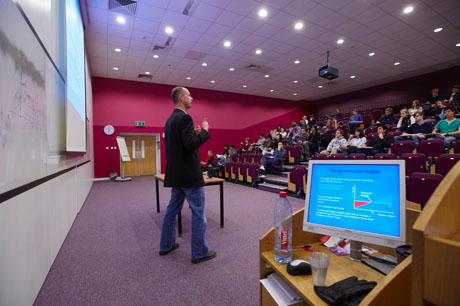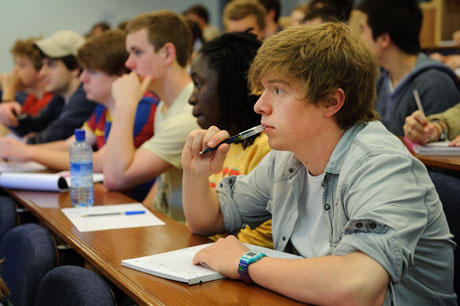View semester dates

BSc (Hons) Mathematics and Finance
Stand out from the competition with a combined degree
Year of entry: 2026/27
View semester dates
Today's financial firms look for those who can carry out sophisticated work with the latest tools.
This maths and finance degree provides the training you need to succeed in finance.
Mathematics underpins all modern science and technology, and mathematicians are in high demand across a variety of fields. This degree also gives you an extensive knowledge of economic and financial theory and will develop strong analytical, empirical and interpretive skills that are highly valued by employers.
Learn more about the study of finance at York.
Course content
In this three-year maths and finance degree, you'll take modules in mathematics, statistics and financial economics. There will also be opportunities to study business finance, computer programming, and other options.
Year 1
The first year develops a foundation in maths and statistics, as well as in general and financial economics.
Core modules
- Foundations and Calculus
- Introduction to Probability and Statistics
- Principles of Economics
- Multivariable Calculus and Matrices
- Data, Evidence and Policy
- Introduction to Finance
Academic integrity module
In addition to the above you will also need to complete our online Academic Integrity module.
Year 2
Your second year will consist of core modules spread across the Department of Mathematics and Department of Economics and Related Studies. We emphasise consolidating quantitative and analytical skills, while still studying core concepts.
Core modules
- Probability and Markov Chains
- Corporate Finance
- Statistical Inference and Linear Models
- Econometric Analysis
Option modules
You will study two option modules. Examples can be found below. Some option module combinations may not be possible. The options available to you will be confirmed after you begin your course.
Year 3
In the final year, you will learn methods of quantitative finance. You'll use techniques to model and forecast interest rates and stock prices.
Core modules
- Mathematical Finance in Discrete Time
- Commodity Markets and Derivative Securities
- Mathematical Finance in Continuous Time
- The Structure and Regulation of Financial Markets
Option modules
You will study two option modules. Examples can be found below. Some option module combinations may not be possible. The options available to you will be confirmed after you begin your course.
Mathematics: Cross-stream
Mathematics: Statistics and Finance stream
- Survival Analysis and Generalised Linear Models
- Decision Theory and Bayesian Statistics
- Advanced Regression and Multivariate Analysis
- Time Series
Economics
- Contemporary Economic Issues and Analysis
- Macroeconomics: Topics in Theory for Policy
- Game Theory
- Monetary Economics
- Commodities Markets and Derivative Securities
- Political Economics
- Financial and Time-Series Econometrics
- Bubbles, Panics and Crashes
- Health Economics
- International Economics
- Applied Econometrics
- Information and Institution Design
- Experimental and Behavioural Economics
- Economics of Social Policy
- The Structure and Regulation of Financial Markets
- Labour Economics
- International Economic Growth & Development
Our modules may change to reflect the latest academic thinking and expertise of our staff, and in line with Department/School academic planning.
Learning outcomes
Every course at York has been designed to provide clear and ambitious learning outcomes. These learning outcomes give you an understanding of what you will be able to do at the end of the course. We develop each course by designing modules that grow your abilities towards the learning outcomes and help you to explain what you can offer to employers. Find out more about our approach to teaching and learning.
Learning outcomes for this course
- Confidently identify those problems that can be analysed by standard mathematical techniques, and those situations in society and business where financial principles can provide insight, and be able to apply those techniques and principles successfully.
- Recognise when an unfamiliar problem is open to pure mathematical investigation and/or mathematical modelling, and be able to adapt and/or synthesise a range of mathematical approaches (including abstraction or numerical approximation) to investigate the problem.
- Deploy the methods of logical and mathematical reasoning used by finance specialists, particularly as regards risk, both to help make financial decisions and to understand formal models of market participants’ behaviour, with an appreciation of the purpose and scope of such methods and models.
- Use logical reasoning to critically analyse statements, arguments or conjectures made by others, and be able to justify the mathematical principles they choose for such a critique.
- Use statistical, econometric and computer-based techniques for analysing data, in applying and testing models or in financial forecasting.
- Engage with, and draw on, academic and professional research in Finance, with an ability to distinguish different themes within it, and to synthesise ideas from it.
- Analyse and critically evaluate financial policies, of government and/or other institutions.
- Communicate complex mathematical and financial ideas clearly, at a level appropriate for the intended audience.

I chose to study economics for a number of reasons, but the primary reason was the excellent employment opportunities this degree accommodates. Because I study economics, my options are open as this degree will give me the skills to pursue multiple different future opportunities. Finance, research, academia and civil service are just a few examples of career prospects.
Fees and funding
The fees and funding information here is for students starting in the 2026/27 academic year.
If you take a year abroad or year in industry you'll pay a reduced rate of fees for that year.
Annual tuition fees
| UK (home) | International and EU |
|---|---|
| £9,535 (TBC) | £27,500 |
The UK government has announced its intention to increase tuition fees from £9,535 to £9,790 for the 2026/27 academic year. We expect this to apply to new UK (home) undergraduate students starting their studies in September 2026.
UK (home) or international fees?
The level of fee that you will be asked to pay depends on whether you're classed as a UK (home) or international student. Check your fee status.
Fees for subsequent years
- UK (home) fees may increase within the government fee cap in subsequent academic years. We will notify you of any increase as soon as we can.
- International fees are subject to increase in subsequent years in line with the prevailing Consumer Price Index (CPI) inflation rate (up to a maximum of 10%).
More information
For more information about tuition fees, any reduced fees for study abroad and work placement years, scholarships, tuition fee loans, maintenance loans and living costs see undergraduate fees and funding.
Funding
We'll confirm more funding opportunities for students joining us in 2026/27 throughout the year.
York, Oxford, Cambridge, Imperial
Just four UK universities are rated Gold for teaching and top ten for research* in the latest national assessment exercises.
* Awarded joint 10th in the Times Higher Education ranking of the Research Excellence Framework 2021.
Teaching and assessment
You’ll study and learn with academics who are active researchers, experts in their field and have a passion for their subjects. Our approach to teaching will provide you with the knowledge, opportunities, and support you need to grow and succeed in a global workplace. Find out more about our approach to teaching and learning.
Teaching format
Lectures and seminars are the main mode of teaching. Some modules have practical computer classes. All modules are supported by extensive online material, including a discussion forum.
- Small group tutorials of 8-10 discuss core lecture ideas, but also teach skills needed for employment after graduation.
- Small group seminars support modules through your first and second year, along with problems classes.
- Third-year lectures are typically smaller and usually include weekly seminars or problems classes.
Timetabled activities
In your first year, you can expect:
| Lectures | 10-13 hours per week |
|---|---|
| Seminars | 2 hours per week |
| Tutorials | 3 hours per semester |
| Problem classes | 1 hour per week |
| Practicals | 1 hour per week |
These figures are representative of a typical week. Your contact hours will vary throughout the year due to your module choices, non-compulsory classes, exam periods and changes to scheduled activities.
Outside your timetabled hours, you'll study independently. This may include preparation for classes, follow-up work, wider reading, practice completion of assessment tasks, or revision.
In the UK, full-time students are expected to spend 1,200 hours a year learning. That's about 40 hours of classes and independent study each week during semesters. Everyone learns at a different rate, so the number of hours you spend on independent study will be different to other students on your course.
Teaching location
You will be based in the Departments of Economics and Mathematics which are both on Campus West. Teaching will be at a variety of locations across Campus West.
About our campus
Our beautiful green campus offers a student-friendly setting in which to live and study, within easy reach of the action in the city centre. It's easy to get around - everything is within walking or pedalling distance, or you can use the fast and frequent bus service. Take a campus tour.
Assessment and feedback
Your maths and finance degree assessments will be mainly examinations and regular homework. Feedback may be through written comments, in-class discussion, model answers, or online discussion board responses.
Careers and skills
Maths and finance degree graduates are in great demand by a wide range of employers. They value the strong analytical and problem-solving skills you'll develop over the course of the degree.
Career opportunities
- Banking and financial services
- Computing and IT
- Engineering
- Public administration
- Logistics
- Hospitality and sales
- Telecommunications
Transferable skills
- Quantitative analysis
- Critical thinking
- Complex problem solving
- Communication skills
Entry requirements
| Qualification | Typical offer |
|---|---|
| A levels | AAA including Mathematics
|
| European Baccalaureate | 85% overall, including 85% in Mathematics. |
| International Baccalaureate | 36 points, including 6 in Mathematics at Higher Level (either Analysis and Approaches or Applications and Interpretations). |
| T levels | We are currently not accepting T Levels for this course unless an additional A Level (or equivalent qualification) in Mathematics has been taken. |
| Scottish Highers / Advanced Highers | Advanced Highers - A in Mathematics plus Scottish Highers - BBBB We may also be able to consider three Advanced Highers or a combination of Highers and Advanced Highers, where an applicant does not meet the grade requirement through Highers alone. Please contact us to discuss your qualifications. |
| International foundation programme | Foundation Certificate from our International Pathway College or an appropriate alternative. |
| Other international qualifications | Equivalent qualifications from your country |
Alternative offers
Meeting the following additional criteria may qualify you for an alternative offer.
| Criteria | Adjustment |
|---|---|
| Widening participation | ABC including A in Mathematics This is conditional upon successful completion of the WP programme including the YorJourney module (Black Access Programme, Next Step York) or successful completion of Realising Opportunities More about widening participation. |
| Contextual offer | ABB including A in Mathematics. |
| EPQ | If you achieve B or higher in the EPQ, you may be eligible for an alternative offer up to one A level grade (or equivalent) below our typical offer. |
English language
If English isn't your first language you may need to provide evidence of your English language ability. We accept the following qualifications:
| Qualification | Minimum requirement |
|---|---|
| IELTS (Academic) | 6.5, with no less than 6.0 in each component |
| IB English | A score of 4 in English A or 5 in English B (Higher Level or Standard Level) |
| Cambridge CEFR | 176, with a minimum of 169 in each component |
| Oxford ELLT | 7, with a minimum of 6 in each component |
| Oxford Test of English Advanced | 136, with a minimum of 126 in each component |
| Duolingo | Integrated subscores: 120 overall, with a minimum of 105 in each component |
| GCSE/IGCSE/O level English Language (as a first or second language) | Grade C / Grade 4 |
| LanguageCert SELT | B2 with a minimum score of 33/50 in each component |
| LanguageCert Academic | B2 with a minimum score of 33/50 in each component |
| Kaplan Test of English Language | 478 Main Flight score with 444 in each component |
| Skills for English | B2: Merit overall, with Pass with Merit in each component |
| PTE Academic | 61, with a minimum of 55 in each component |
| TOEFL | 87 overall, with a minimum of 21 in each component (taken before January 2026) 4.5 with 5 in Listening and 4.5 in each other component (taken after January 2026) |
| Trinity ISE III | Merit in all components |
| Other English language qualifications | We also accept other English Language qualifications, including various school-leaving certificates. |
For more information see our undergraduate English language requirements.
If you haven't met our English language requirements
You may be eligible for one of our pre-sessional English language courses. These courses will provide you with the level of English needed to meet the conditions of your offer.
The length of course you need to take depends on your current English language test scores and how much you need to improve to reach our English language requirements.
After you've accepted your offer to study at York, we'll confirm which pre-sessional course you should apply to via You@York.
Next steps
Contact us
Get in touch if you have any questions
Discover York








